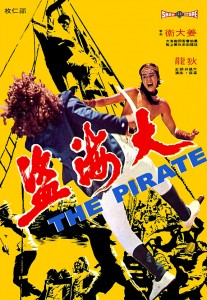Director: Chang Cheh
Co-Directors: Pao Hsueh Lieh, Wu Ma
Writer: Ni Kuang
Producer: Runme Shaw
Cast: Ti Lung, David Chiang, Fan Mei Sheng, Bruce Tong, Yuen Man Tzu, Dean Shek, Tin Ching, Lau Gong, Wu Chih Ching, Yue Fung, Alan Chan Kwok Kuen, Chan Dik Hak
Running Time: 96 min.
By Matthew Le-feuvre
Although Chang Cheh will be fondly remembered for his long association with the Shaw Brothers, there was always more to this film-making zeitgeist than geysering blood, decapitations, disembowelment or torturous imagery. In addition to his prolificacy, Cheh’s alternative meditations occasionally embraced social commentary, usually with concerns about modern youth or the impact of organised crime and how each reflected on urban domesticity: these issues were candidly explored in a handful of films like, The Generation Gap, Young People and The Singing Killer – all starring the iconic David Chiang. However overtly sandwiched between [these] historical romps and contemporary expositions, Cheh often delved into ‘escapist’ theatre, the idea being to steer audiences away from apathy at times when looming social or economic shifts threatened stability in south-east Asia, particularly in Hong Kong. In any case, this strategy worked; mellowing the masses and even inducing the most hardened of critics.
Economics aside, in the advent of Cheh’s most popular, though at intervals ‘ contrived ‘ masterpieces: The One Armed Swordsman, Have Sword Will Travel, Vengeance and The Duel by example, the premiere of The Pirate did not really stir much enthusiasm or controversy upon its initial release back in 1973. Understandably, the general populace were more interested about the circumstances behind Bruce Lee’s demise than in box office ratings or forthcoming attractions. In fact, it was considered something of a commercial distraction than a celebration which Hong Kong audiences widely perceive a movie should represent. Anyhow, retrospectively, The Pirate was a slightly pallid expression of high adventure, drawing inspiration no doubt from the familiar archetypes of Robin Hood, The Sea Hawk and The Buccaneers, cross-bred and extravagantly moulded to adhere with Cheh’s signature pastiche for male bonding, a raised fist against the establishment as well as the obligatory betrayer whom the central protagonist has too contend with. Although these components were laxed, there is still enough tension, brutality and innovation to an otherwise enjoyable and dazzling cult rediscovery that, to a point, doesn’t take itself too seriously; yet beneath the surface, Cheh’s palpable hatred of despotism is all too customary, even from the picture’s outset.
Featuring an explosive opening sea channel battle between British Imperialists and indigenous pirates, led by the debonair Chang Pao Chai (Ti Lung). The complex screenplay acts much like the ocean itself, unpredictable one minute and sedate in the next, echoing filmic parallels from Akira Kurosawa to Sam Peckinpah as our deeply flawed anti-hero begins an impromptu journey from the leaking bowels of his vessel to the nearby shoreline of southern china where – masquerading as a rich trader – he becomes unintentionally embroiled with a group of local villagers/ fishermen, whose struggle against exploitation and corruption has forced them into destitution. To quicken repairs, Pao Chai sympathetically agrees to expedite funds for the villagers using currency and jewels plundered from invading colonists.
Returning to his anchored ship/junk, Pao Chai discovers that a vengeful former crew member, Hue er-Dao (Fan Mei Sheng); an escaped convict, has appropriated not only his damaged vessel, but goods and an undisciplined crew. This situation compromises him to take refuge in a gambling house. There he collides with General Wu (David Chiang), a disillusioned loyalist dispatched to apprehend Pao Chai – dead or alive. However as their friendship develops, Wu becomes aware of Pao Chai’s chivalrous nature and, intermittently, begins to question his own moral servitude: what consequences will eventuate? Will Pao Chui retrieve his junk and capital to deliver the villagers from an uncertain fate? Or will Wu conform to his civic duty and arrest Pao Chai?
Verdict: In spite of its somewhat intoxicating artificiality, forty-one years on The Pirate remains a lesser recognized, yet interesting cinematic experience that doesn’t solely rely on political subtleties, trademark cinematography or protracted duels for personal entertainment. On the contrary, the defining novelty of both Ti Lung and David Chiang spearheading their eighteenth collaboration for an indelible saga of obligation, revenge and misguided loyalties, is itself a landmark achievement even by Hollywood conventions.
Matthew Le-feuvre’s Rating: 8/10





Too bad this movie is not even available to get.
Actually, I have it.